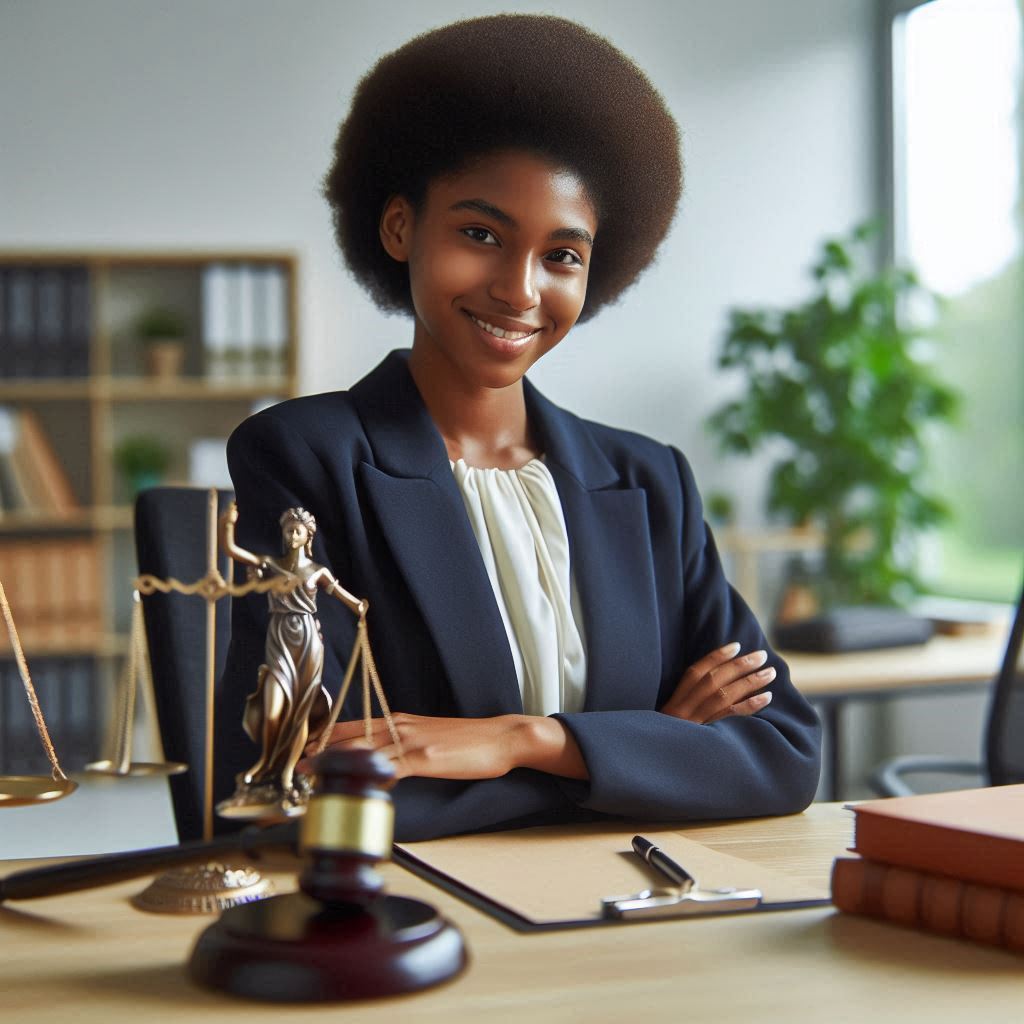Introduction
Human rights lawyers play a crucial role in advocating for justice and equality. They champion the rights of individuals facing injustice and oppression.
These legal professionals fight tirelessly to uphold fundamental freedoms and safeguard human dignity.
Human rights lawyers work on cases that often involve complex legal and ethical issues.
They handle cases related to discrimination, torture, and wrongful imprisonment.
Their work is vital in challenging abuses of power and holding perpetrators accountable.
Prominent human rights lawyers include Nelson Mandela, who fought against apartheid in South Africa, and Amal Clooney, known for her work on international human rights and humanitarian issues.
Their high-profile cases highlight the impact these lawyers can have on global human rights.
The importance of human rights lawyers in the legal field cannot be overstated. They bring attention to human rights violations that might otherwise go unnoticed.
By advocating for marginalized and oppressed individuals, they promote justice and equality in society.
These lawyers also contribute to shaping human rights laws and policies. Their legal expertise helps in drafting legislation that protects fundamental rights.
They serve as a voice for those who cannot advocate for themselves, ensuring that justice prevails.
In summary, human rights lawyers are essential to the legal field.
Their dedication to defending human rights and pursuing justice makes a significant impact on societies worldwide.
Their work ensures that human dignity and equality are upheld in the face of injustice.
Profile of Amal Clooney
Amal Clooney is a prominent human rights lawyer known for her work advocating for justice and human rights.
Background information
Amal Clooney, born Amal Alamuddin, was born on February 3, 1978, in Beirut, Lebanon.
She studied law at St Hugh’s College, Oxford, and later pursued a career in international law.
Clooney has worked at prestigious law firms in both London and New York, specializing in human rights law.
Notable cases she has worked on
Clooney represented the country of Armenia in the European Court of Human Rights in a case involving the denial of the Armenian Genocide by Turkey.
She also represented Nadia Murad, a Yazidi woman who was captured and enslaved by ISIS, in seeking justice for war crimes and genocide.
Transform Your Career Today
Unlock a personalized career strategy that drives real results. Get tailored advice and a roadmap designed just for you.
Start NowClooney has represented journalists, political prisoners, and marginalized groups in various high-profile cases around the world.
Impact of her work on human rights advocacy
Amal Clooney’s work as a human rights lawyer has had a significant impact on the field of human rights advocacy.
Her work has led to positive outcomes for her clients and has helped to advance human rights causes globally.
She has brought attention to important human rights issues through her high-profile cases and advocacy work.
Clooney’s commitment to justice and equality has inspired others to pursue careers in human rights law and advocacy.
Read: Career Opportunities for Human Rights Lawyers
Profile of Bryan Stevenson
Background information
Bryan Stevenson is a prominent human rights lawyer and founder of the Equal Justice Initiative (EJI).
He was born in 1959 in Milton, Delaware. Stevenson earned his law degree from Harvard Law School and began his career focusing on criminal justice reform.
His work has significantly impacted the American legal system.
Notable cases he has worked on
One of Stevenson‘s notable cases is that of Walter McMillian, a Black man wrongfully convicted of murder in Alabama.
McMillian‘s case highlighted systemic racism and wrongful convictions. Stevenson‘s relentless efforts led to McMillian‘s exoneration after six years on death row.
This case exemplifies his commitment to justice and his battle against racial bias in the legal system.
Another significant case involved the defense of juvenile lifers sentenced to life without parole.
Stevenson fought for the rights of these young offenders, arguing that such sentences are unconstitutional.
His work contributed to the landmark Supreme Court decision in Miller v. Alabama, which ruled that mandatory life sentences without parole for juveniles are unconstitutional.
This ruling represents a critical shift in juvenile justice.
Impact of his work on criminal justice reform
Stevenson‘s impact extends beyond individual cases.
He has advocated for broad criminal justice reform, focusing on racial equality and the abolition of the death penalty.
His efforts have led to the establishment of the National Memorial for Peace and Justice, which commemorates the victims of racial terror lynchings in America.
His work has inspired many and has brought national attention to the issues of racial injustice and mass incarceration.
Transform Your Career Today
Unlock a personalized career strategy that drives real results. Get tailored advice and a roadmap designed just for you.
Start NowBryan Stevenson‘s legacy includes his advocacy for the underserved and his tireless efforts to reform a flawed justice system.
His work continues to influence the fight for human rights and justice reform.
Read: How Bankruptcy Trustees Manage Secured Debts
Profile of Malcolm X
Background Information
Malcolm X, born Malcolm Little, was an African American human rights activist and prominent figure in the civil rights movement.
Raised in a turbulent environment, Malcolm X experienced racial discrimination from a young age, shaping his views on racial equality.
After a troubled youth, Malcolm X found Islam during his time in prison, which became a central tenet of his beliefs.
Notable Cases He Has Worked On
Malcolm X was known for his advocacy for the rights of African Americans, speaking out against police brutality and systemic racism.
He was involved in high-profile cases where he defended individuals who faced wrongful convictions or were victims of racial injustice.
Malcolm X’s most notable case was his defense of the Nation of Islam, a religious and political organization that he was a member of.
Impact of His Work on Civil Rights Movements
Malcolm X’s work had a significant impact on the civil rights movements of the 1960s, challenging the status quo and demanding equality.
His powerful speeches and fearless activism inspired many to fight for racial justice and equality in the face of oppression.
Malcolm X’s legacy lives on today as a symbol of resistance and empowerment for marginalized communities around the world.
Read: Day in the Life of a Human Rights Lawyer

Profile of Nelson Mandela
Background information
Nelson Mandela, born in 1918 in South Africa, became an iconic figure in human rights law.
He grew up in the Thembu royal family and studied law at the University of Fort Hare and the University of Witwatersrand.
Mandela‘s activism began in the 1940s with the African National Congress (ANC).
Notable cases he has worked on
One of Mandela’s notable cases was his involvement in the Rivonia Trial. In 1961, he and others were accused of sabotage against the apartheid regime.
Mandela defended his involvement and argued for the liberation of oppressed people. His speech from the dock became famous for its call for justice and equality.
Mandela‘s legal career also included advocating for workers‘ rights and against discriminatory laws.
His work extended beyond the courtroom, involving significant grassroots activism.
Transform Your Career Today
Unlock a personalized career strategy that drives real results. Get tailored advice and a roadmap designed just for you.
Start NowHe led the ANC’s campaign against the apartheid laws, mobilizing international support.
Impact of his work on ending apartheid in South Africa
Mandela‘s efforts had a profound impact on ending apartheid. His leadership inspired both national and global movements.
In 1990, after 27 years of imprisonment, Mandela‘s release marked a turning point.
His presidency in 1994 was a symbol of reconciliation and the beginning of a new era in South Africa.
Mandela’s work fundamentally changed South Africa‘s legal and social landscape. His legacy continues to influence human rights advocacy worldwide.
His dedication to justice remains a powerful example of how legal expertise and activism can transform societies.
Read: Bankruptcy Trustee‘s Role in Business Bankruptcies
See Related Content: Contract Management Software: Best Options in 2024
Profile of Ruth Bader Ginsburg
Background Information
Ruth Bader Ginsburg was born on March 15, 1933, in Brooklyn, New York.
She attended Harvard Law School and Columbia Law School.
Notable Cases She Has Worked On
- United States v. Virginia (1996) – Ginsburg wrote the majority opinion striking down the Virginia Military Institute’s male-only admissions policy.
- Ledbetter v. Goodyear Tire & Rubber Co. (2007) – Ginsburg dissented against limiting the time period for filing pay discrimination claims.
- Shelby County v. Holder (2013) – Ginsburg dissented in this case that struck down key provisions of the Voting Rights Act.
Impact of Her Work on Gender Equality and Women’s Rights
Ruth Bader Ginsburg has been a pioneering figure in the fight for gender equality and women’s rights.
Her work as a lawyer and Supreme Court Justice has had a profound impact on shaping laws and policies that promote equality for women in various spheres of society.
Her dedication to advancing gender equality can be seen in the landmark cases she has worked on throughout her career.
Ginsburg’s strategic approach to litigation and her persuasive arguments have paved the way for significant legal victories that have advanced the rights of women and marginalized communities.
Ginsburg’s efforts have not only impacted the legal landscape but have also inspired generations of women to pursue careers in law and advocate for gender equality.
Her role as a champion for women’s rights and a trailblazer in the legal field has made her a revered figure both in the United States and around the world.
In short, Ruth Bader Ginsburg’s legacy as a human rights lawyer will continue to inspire future generations to fight for justice, equality, and the protection of fundamental rights for all individuals, regardless of gender or background.
Comparison of different approaches taken by human rights lawyers
Legal strategies used by different human rights lawyers
- Lawyer A believes in precedent-setting cases to create legal change.
- Lawyer B leverages human rights treaties and conventions for advocacy.
- Lawyer C strategically chooses forums based on the nature of the case.
- Lawyer D uses public pressure to hold governments and corporations accountable.
Analysis of the similarities and differences in their approaches
- All lawyers share a commitment to promoting and protecting human rights.
- Each lawyer tailors their approach to the specific context and needs of the case.
- While there are differences in tactics, the end goal remains the same.
- Collaboration and knowledge-sharing among lawyers can lead to stronger advocacy.
Gain More Insights: Steps to Become a Legal Secretary in the USA
Conclusion
Human rights lawyers play a crucial role in upholding justice and advocating for the rights of individuals worldwide.
Through their dedication and hard work, they have been able to bring to light cases of injustice and hold authorities accountable for their actions.
Transform Your Career Today
Unlock a personalized career strategy that drives real results. Get tailored advice and a roadmap designed just for you.
Start NowThese lawyers have made significant contributions to the global human rights movement by representing marginalized communities, challenging oppressive laws, and setting legal precedents that protect fundamental rights.
Their impact extends beyond the courtroom, inspiring others to stand up for justice and equality.
As we reflect on the work of notable human rights lawyers and their cases, we are reminded of the power of legal advocacy in promoting social change and defending the rights of all individuals.
Their efforts have helped shape the international legal framework and set standards for human rights protection around the world.
[E-Books for Sale]
The Big Book of 500 High-Paying Jobs in America: Unlock Your Earning Potential
$19.99 • 500 High-Paying Jobs • 330 pages
Explore 500 high-paying jobs in America and learn how to boost your career, earn more, and achieve success!
See All 500 High-Paying Jobs of this E-Book
1001 Professions Without a Degree: High-Paying American Jobs You Can Start Now
$19.99 • 1001 Professions Without a Degree • 174 pages
Discover 1001 high-paying jobs without a degree! Unlock career tips, skills, and success strategies for just $19.99!




